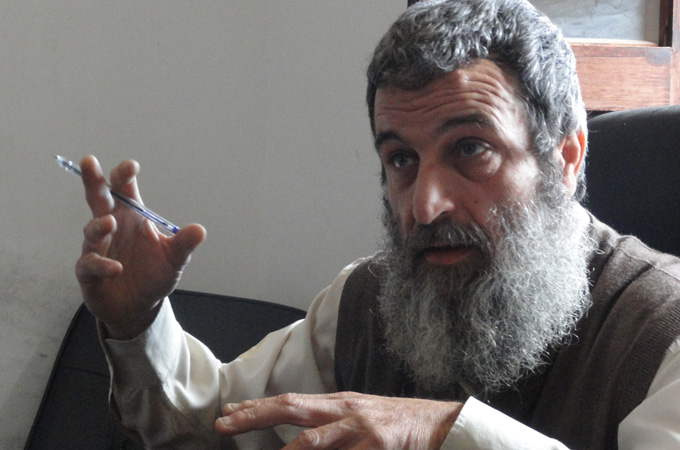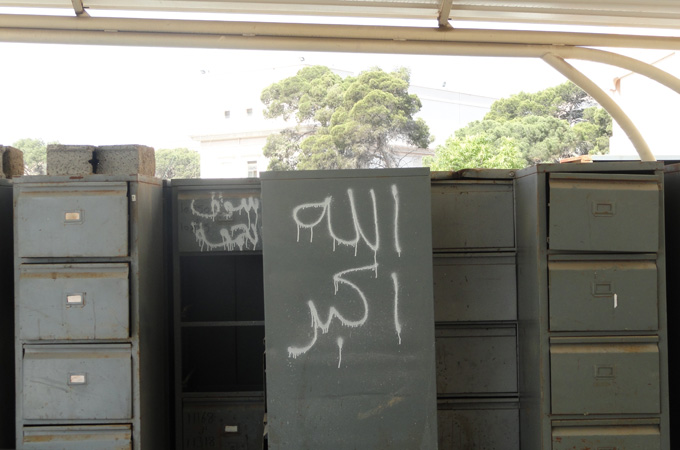Reporter’s Notebook: The would-be assassin
Post-Gaddafi Libya is a reporter’s dream – a place where stories of a previous era now pour from its people freely.

Libya is a journalist’s dream, not for the cynical reasons of conflict and violence, but for the stories that come pouring out of its people, uncoaxed and unbeckoned.
At times, a look is all that is required to invite Libyans, who after decades of living under the extreme oppression of fallen dictator Muammar Gaddafi can finally speak freely, to open up. Confirming those stories is another matter.
I was in Tripoli in May, working on a series of stories in the lead up to the country’s first post-Gaddafi elections. Patiently waiting our turn in the office of one potential candidate for the national assembly, my fixer Asaad and I solidified our plans for the day.
 |
| Issa was keen to share the story of his detention and torture at the hands of the Gaddafi regime [D. Parvaz/Al Jazeera] |
I looked up and saw a man who looked like a Salafi Robert De Niro staring at me. Before I had the chance to look down at my notepad, he started speaking, and Asaad translated.
“You know, I tried to assassinate Gaddafi in 1986,” he said, calmly, with a hint of a smile. I wanted to hear more, so we set up an interview for later in the day.
Here is the story 49-year-old Jamal al-Mokhtar bin Issa, told me – a yarn that involves an assassination attempt, betrayal, torture and, yes, Nancy Reagan, the wife of then US president, Ronald Reagan:
“Things started happening around 1978 … I’d seen that Gaddafi wasn’t a good leader – he was corrupt, stealing people’s money, taking their homes and shutting down their businesses.
“So we started to protest, destroying his portraits, things like that. But then I noticed that I lived right in front of the place where Gaddafi gave his [annual] speeches, at Martyr’s Square, so that’s when me and my friends got the idea, in 1982, for the assassination.
“In 1983, we started gathering the group that was going to be involved, and by 1984, we had the full group, and we were able to steal weapons from the 77th Brigade – and we found our sniper, who was with that brigade.
“We had the location and we had the weapons, and we were waiting for him to give the speech.
“There were 15 of us involved, and the planning was similar to the assassination of [Anwar] Sadat. We’d have a sniper on the roof of my house, and people mixed in with the crowd cheering for him, who would throw grenades. We didn’t have the grenades yet, but that was the plan.
 |
| Records of Issa’s arrest were not available – burned and rusted filing cabinets at the archives office illustrate why [D. Parvaz] |
“Gaddafi’s snipers would usually be on top of my building and there were tanks on the streets, so we’d certainly get killed.”
But someone within the group secretly created a second group, one that planned to assassinate a government minister.
When those responsible for yet another assassination – this one in Benghazi – were caught, a member of this second group panicked and informed on Issa’s crew.
“The sniper, Nourudine, was the first one to be arrested. After he was beaten and tortured, he confessed that the weapons were at my house. On August 19, they came and took the weapons … I wasn’t home … but at 2pm the next day, I turned myself in …. And then, torture and interrogation.”
Here is where Issa’s story takes a turn for the surreal:
“They made a documentary about us, saying we belong to a terrorist organisation with a lot of weapons. They sentenced us to death. There was never a trial, we never went to court. No lawyers.
“They never actually aired the documentary, I think because it would give others an idea to do the same. But they filmed us – they made us say the United States was involved in the assassination attempt, saying we were agents of William Casey, who was the director of the CIA, and they had a letter with the congressional stamp on it from Nancy Reagan to her husband, saying that Jamal al-Mokhtar bin Issa was an agent for William Casey.”
Issa himself was clearly amused and baffled by this detail.
“The guys in Benghazi were hanged around 15 days after the assassination there, and my group were to be hanged within a month ….
“We were in prison, waiting to be hanged, but apparently it got cancelled, because I’m still alive. They let me out of jail in 1988. I don’t know why I wasn’t hanged or why I was freed, and I didn’t ask. Who would I ask?”
Issa was watched closely after that, and every time Gaddafi gave a public speech, he was either detained or had to deal with Gaddafi guards at his home.
Issa was anxious to get his hands on records of his detention, especially the Nancy Reagan letter. With him, we went to the archives office, a ramshackle building where empty, burned and rusted filing cabinets lined the parking lot, promising little in the way of available records. Few offices in the building had a computer, and most of the office shelves were empty.
We were told that if records were found, we would be contacted. We never got that call.
News of Gaddafi’s death in October of 2011 was just what Issa was hoping for:
“When I heard that Gaddafi had been killed, it was like an enormous weight had been lifted off my chest. I could not calm myself down until I went to see his body in Misrata. And I said: ‘Who are you? [as Gaddafi was prone to say] You can’t answer me, because you’re dead.'”
Issa smiled, triumphant, as he had survived to tell his story.
Follow D Parvaz on Twitter: @DParvaz